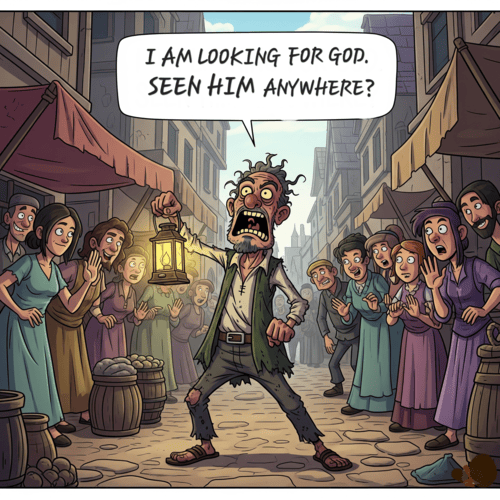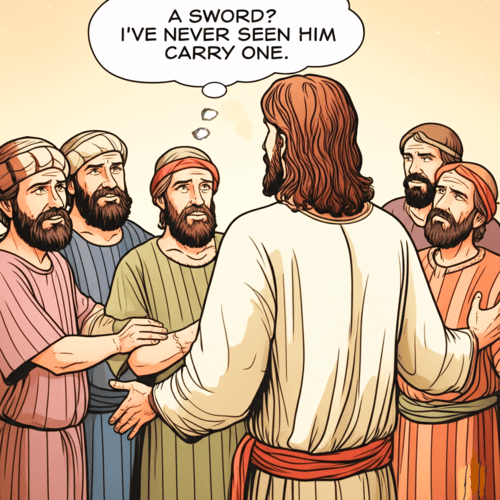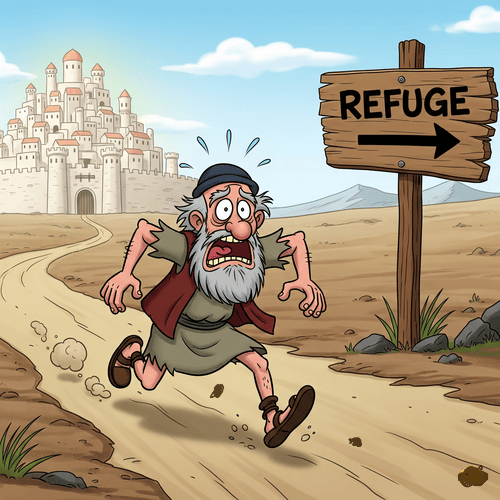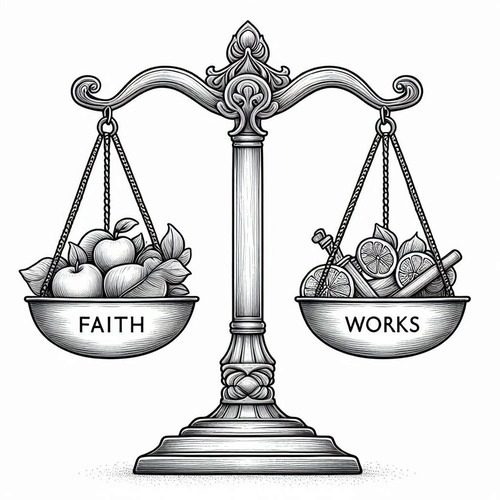What Does Jesus Save Us From?
THREE BIBLE TRUTHS ABOUT SALVATION
“Jesus saves.” We’ve seen it on bumper stickers, heard it shouted at sporting events, maybe even rolled our eyes over its simplicity. But what if we told you the two-word declaration contains the most profound truth in human history—once we understand what Jesus actually saves us from.
The answer hinges on grasping something our culture desperately wants to forget: God’s absolute holiness. Scripture reveals a God so perfectly pure that even the seraphim cover their faces in His presence (Isaiah 6:2). This isn’t the gentle grandfather figure of popular imagination, but “a consuming fire” (Hebrews 12:29). His holiness demands perfect righteousness, and His justice requires that sin be punished.
Throughout Scripture, those who approached God on their own terms paid dearly. Nadab and Abihu offered unauthorised fire and were consumed (Leviticus 10:1-2). Uzzah steadied the ark and died instantly (2 Samuel 6:6-7). The message is clear: we approach Holy God only on His terms, not ours.
This sets the stage for understanding what makes Christ’s offer so staggering—and what we desperately need saving from.
1. JESUS SAVES US FROM GOD’S WRATH
The first and most fundamental truth is this: Jesus saves us from the wrath of a holy God.
“The wrath of God is being revealed from heaven against all the godlessness and wickedness of people” (Romans 1:18). This isn’t a divine anger management issue—it’s the righteous response of perfect holiness to moral rebellion. “All have sinned and fall short of the glory of God” (Romans 3:23), which means every human being stands condemned before God’s perfect standard.
But here’s where the gospel blazes with glory: “Since we have now been justified by his blood, how much more shall we be saved from God’s wrath through him!” (Romans 5:9). Christ didn’t merely show us God’s love—He absorbed God’s wrath. As our substitute, Jesus received the punishment our sins deserved. “God made him who had no sin to be sin for us, so that in him we might become the righteousness of God” (2 Corinthians 5:21).
This substitutionary sacrifice means we can have “peace with God through our Lord Jesus Christ” (Romans 5:1). The wrath that should have consumed us was poured out on Him instead.
2. JESUS SAVES US FROM SIN’S ENSLAVING POWER
Second, Jesus saves us from sin’s dominating control over our lives.
Before Christ, we weren’t just people who occasionally made poor choices—we were “slaves to sin” (Romans 6:6). Sin wasn’t our master by accident; it ruled us completely. Jesus Himself declared, “Everyone who sins is a slave to sin” (John 8:34).
But the cross changed everything. “We know that our old self was crucified with him so that the body ruled by sin might be done away with, that we should no longer be slaves to sin” (Romans 6:6). Through Christ’s death and resurrection, “sin shall no longer be your master, because you are not under the law, but under grace” (Romans 6:14).
This isn’t just positional truth—it’s practical reality. As Paul testified, “I have been crucified with Christ and I no longer live, but Christ lives in me” (Galatians 2:20). The same power that raised Christ from the dead now works in believers, progressively transforming us “into his image with ever-increasing glory” (2 Corinthians 3:18).
We’re no longer helpless victims of our sinful nature. In Christ, we have genuine freedom to choose righteousness.
3. JESUS SAVES US FROM ETERNAL SEPARATION
Third, Jesus saves us from the ultimate consequence of sin: eternal death and separation from God.
“The wages of sin is death” (Romans 6:23)—not just physical death, but spiritual death that extends into eternity. Revelation describes this soberly: those whose names aren’t written in the book of life face “the second death” in “the lake of fire” (Revelation 20:14-15).
But listen to Jesus’ promise: “Whoever believes in him shall not perish but have eternal life” (John 3:16). More than escape from hell, this is entrance into unending fellowship with God. “Whoever hears my word and believes him who sent me has eternal life and will not be judged but has crossed over from death to life” (John 5:24).
For believers, death itself becomes defeated. Paul triumphantly declares, “Death has been swallowed up in victory. Where, O death, is your victory? Where, O death, is your sting?” (1 Corinthians 15:54-55).
CONCLUSION: THE FREE GIFT WE’D BE FOOLS TO REJECT
Here’s what makes Christ’s offer even more remarkable: this salvation is completely free. “The gift of God is eternal life in Christ Jesus our Lord” (Romans 6:23). “By grace you have been saved through faith—and this is not from yourselves, it is the gift of God—not by works, so that no one can boast” (Ephesians 2:8-9).
We’d have to be downright foolish to reject free salvation from God’s holy wrath, sin’s enslaving power, and eternal death. Yet Scripture warns that many do: “Whoever rejects the Son will not see life, for God’s wrath remains on them” (John 3:36).
Don’t let that be your story. The same holy God who demands perfection offers it freely through His Son. “Everyone who calls on the name of the Lord will be saved” (Romans 10:13).
The question isn’t whether Jesus saves—it’s whether we’ll receive what He offers. Today is “the time of God’s favour” (2 Corinthians 6:2). Will you call on Him?
WHAT DOES JESUS SAVE US FROM? RELATED FAQs
What was God the Father communicating by tearing the temple curtain at Jesus’ death? When Jesus died, “the curtain of the temple was torn in two from top to bottom” (Matthew 27:51)—significantly, from top to bottom, indicating God Himself did the tearing. This thick veil had separated the Holy of Holies from human access for over 1,400 years, symbolising that sin blocked our approach to God’s presence. By rending it at the precise moment of Christ’s death, the Father was declaring Jesus’ sacrifice had removed the barrier between holy God and sinful humanity. No longer would people need priests, sacrifices, or special ceremonies to approach God—the way into His presence was now open through Christ’s blood (Hebrews 10:19-20). The supernatural timing and direction of this tear was God’s dramatic announcement that the old system was now finished and a new covenant had begun.
- What precautions did God require at Mount Sinai to protect people from His holiness? God commanded Moses to “set bounds for the people around the mountain” and warned anyone who touched it would die (Exodus 19:12-13). Even the priests had to consecrate themselves before approaching, and God specifically said “the people must not force their way through to see the LORD or many of them will perish” (Exodus 19:21). The mountain was so charged with God’s presence that it smoked like a furnace and trembled violently (Exodus 19:18).
- How did the Old Testament tabernacle and temple design reflect God’s holiness? The tabernacle had multiple barriers: an outer court for all Israelites, an inner court for priests only, and the Holy of Holies where only the high priest could enter once per year on the Day of Atonement (Leviticus 16:2). The thick veil separating the Holy of Holies was designed to protect people from God’s consuming presence. When this veil tore at Christ’s death (Matthew 27:51), it symbolized direct access to God through Jesus’ sacrifice.
- What special protocols surrounded transporting the Ark of the Covenant? The ark could only be carried by Levites using poles inserted through rings—it was never touched directly (Numbers 4:15). It was covered with multiple layers of cloth before transport, and unauthorised viewing could bring death (Numbers 4:20). Even when the Philistines captured it, they experienced God’s judgement through tumours breaking out, and death until they returned it with guilt offerings (1 Samuel 5-6).
Why did Jesus have to be both fully God and fully man to save us? Only God could bear the infinite weight of divine wrath against sin, but only a human could represent humanity as our substitute. As the God-man, Jesus could offer a sacrifice of infinite value while truly standing in our place. He had to be sinless to be an acceptable offering, yet truly human to be our kinsman-redeemer (Hebrews 2:14-17).
WHAT DOES JESUS SAVE US FROM? OUR RELATED POSTS
Editor’s Pick

How God Reveals Himself to Us: General and Special Revelation
Every human heart carries an undeniable longing to know ultimate truth—to understand our place in the universe and the longing [...]

Doctrine of God and Bible Interpretation: Are The Two Connected?
Picture this: Two seasoned pastors read the same verse about God's sovereignty and human responsibility. One concludes God determines all [...]

What Did Jesus Mean: ‘I Bring Not Peace But a Sword’?
Jesus’ statement may sound perplexing to us at first read: "Do not think that I have come to bring peace [...]

The Beatitudes: The Nine Marks of Those Jesus Calls Blessed
When Jesus climbed that hillside in Galilee and began to speak, He turned the world's understanding of blessing upside down. [...]

Sacred Sorrow: Why Jesus Calls Mourning a Blessing
MAKING SENSE OF THE DIVINE PARADOX IN MATTHEW 5:4 When Jesus declared, “Blessed are those who mourn, for they will [...]

‘Sell Everything You Have…’: Are We To Do So Literally?
When Jesus encountered the rich young ruler in Matthew 19:21, His words cut through with startling clarity: “If you want [...]

Why Jesus Said ‘It’s Better I Go Away’…
THE SUPERIOR GIFT OF THE HOLY SPIRIT “Nevertheless, I tell you the truth: it is to your advantage that I [...]

What About Those Who’ve Never Heard the Gospel?…
WILL GOD SHOW THEM MERCY ON JUDGEMENT DAY? Few questions tug at the Christian’s heart like this one. Picture the [...]

Cities of Refuge: Foreshadowing Our Safe Haven in Jesus
Picture this: A man is chopping wood with his neighbour when the axe head flies off the handle, striking and [...]

Testament to Design: The Engineering Marvel of Elephants
Picture an African elephant delicately plucking a single acacia leaf with the tip of its trunk, then moments later using [...]





